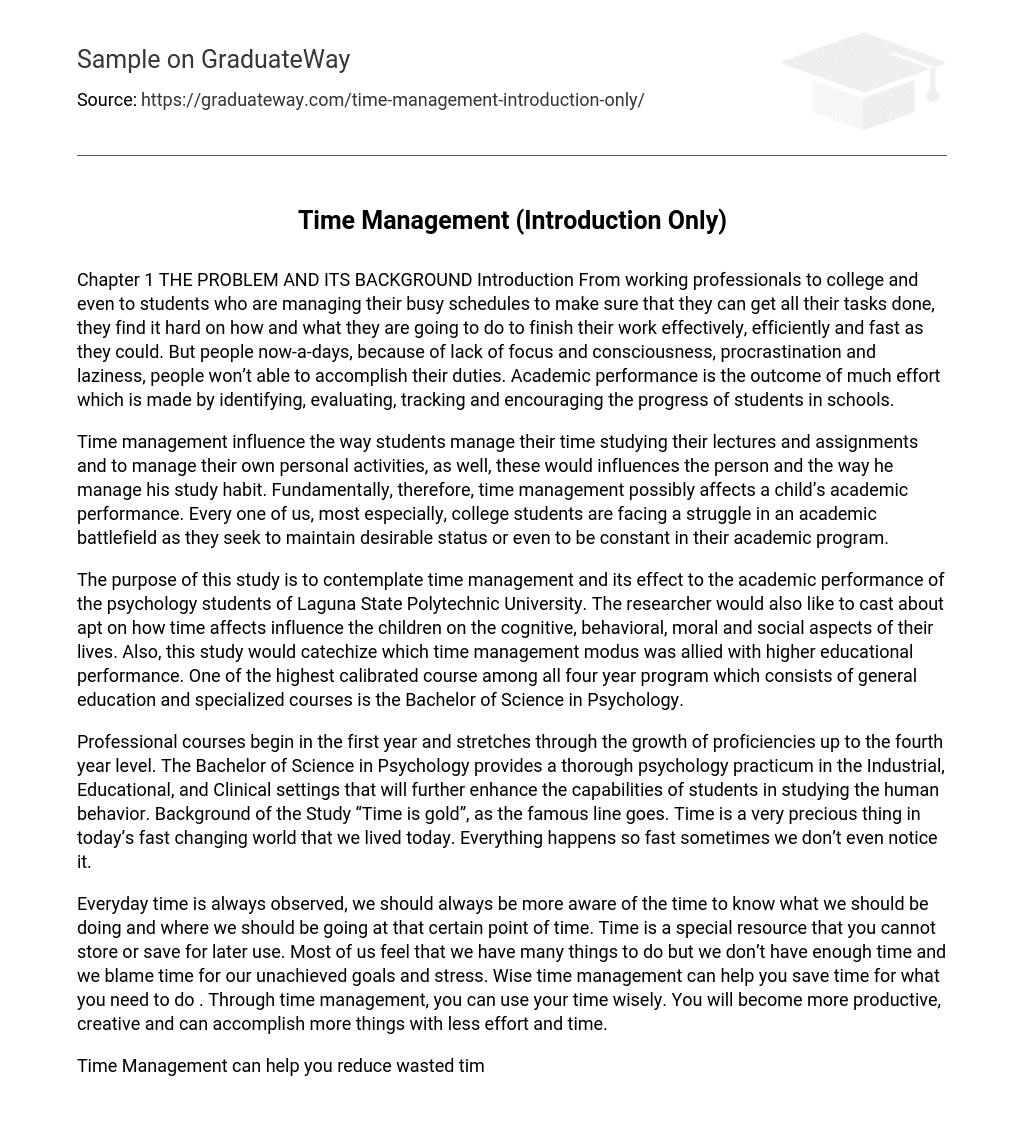Both working professionals and college students face the challenge of managing busy schedules. Difficulties such as lack of focus, consciousness, procrastination, and laziness can impede the completion of tasks. These obstacles also have a negative impact on academic performance, which involves identifying, evaluating, tracking, and encouraging student progress in schools.
Effective time management is essential for college students as it greatly influences their study habits and academic performance. Balancing the demands of lectures, assignments, and personal activities can be challenging, making proper time allocation crucial for maintaining a favorable academic status.
The objective of the study is to examine how time management affects the academic performance of psychology students at Laguna State Polytechnic University. It also aims to investigate the influence of time on children’s cognitive, behavioral, moral, and social development. Furthermore, this research will evaluate the correlation between different time management strategies and achieving higher education. The Bachelor of Science in Psychology program includes comprehensive coursework covering both general education and specialized subjects.
Professional courses are offered from the first through fourth years to enhance students’ proficiency. The Bachelor of Science in Psychology program includes a comprehensive practicum in Industrial, Educational, and Clinical settings, which deepens students’ understanding of human behavior. The significance of time in our rapidly evolving world cannot be overstated. It is a precious resource that often slips by unnoticed.
Observing and being mindful of everyday time is essential for staying organized and reaching our goals. Time cannot be postponed or wasted, as it is a valuable resource. The workload we face can overwhelm us and lead to blaming time for stress and unaccomplished goals. However, effective time management allows us to allocate enough time for necessary tasks. By implementing proper strategies, we can optimize our use of time, leading to increased productivity, creativity, and the ability to accomplish tasks more easily and efficiently.
Managing time effectively is crucial for achieving balance and fulfillment in life, especially as students. It is essential to have control over our time and possess efficient time management skills. This includes allocating time for socializing, spending quality time with family, and dedicating sufficient time for studying. Regrettably, many of us face difficulties in keeping track of our schedules, leading to tardiness in class. Punctuality holds great significance for students as it directly affects our learning experience. Even a few minutes missed from attending classes or work can result in severe consequences.
Time management is a subset of various concepts, including project management. It is also known as project planning and project scheduling. Additionally, time management is recognized as one of the core functions in project management. Another concept related to time management is attention management, which involves managing cognitive resources and the allocation of time for conducting activities, both for individuals and their employees.
Professor Stephen Smith, from BYUI, and other sociologists have demonstrated the correlation between workers’ perception of time and various social matters such as family norms, gender roles, and personal work effort. Pioneering authors, including Tim Ferriss with his book “The 4 Hour Workweek” and Stefania Lucchetti with “The Principle of Relevance,” have focused on time management in the context of digital information overload. Additionally, Stephen R. Covey has examined different approaches to time management and provided a categorization scheme for them.
- First generation: reminders based on clocks and watches, but with computer implementation possible; can be used to alert a person when a task is about to be done.
- Second generation: planning and preparation based on a calendar and appointment books; includes setting goals.
- Third generation: planning, prioritizing, controlling (using a personal organizer, other paper-based objects, or computer or PDA-based systems) activities on a daily basis. This approach implies spending some time in clarifying values and priorities.
- Fourth generation: being efficient and proactive using any of the above tools; places goals and roles as the controlling element of the system and favors importance over urgency.
By understanding the influence of time management on students’ academic performance, we can effectively intervene and enhance their chances of earning satisfactory grades and successfully completing their higher education. The study will take place at Laguna State Polytechnic University, Santa Cruz Campus, with the researcher’s fellow Psychology students participating as respondents.





